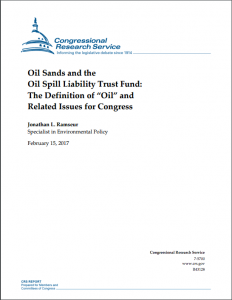Full Title: Oil Sands and the Oil Spill Liability Trust Fund: The Definition of “Oil” and Related Issues for Congress
Author(s): Jonathan L. Ramseur
Publisher(s): Congressional Research Service
Publication Date: February 1, 2017
Full Text: Download Resource
Description (excerpt):
In 2005, the United States imported approximately 217 million barrels of oil-sands-derived crude oils from Canada. In 2015, that figure increased to 587 million barrels, accounting for approximately 22% of crude oil imports from all nations. Pipeline oil spills, including the 2010 Enbridge spill in Michigan and the 2013 ExxonMobil spill in Arkansas, involved this material and generated interest from policymakers and a variety of stakeholders.
The Oil Spill Liability Trust Fund (OSLTF) provides an immediate source of federal funding to respond to oil spills in a timely manner. Monies from the OSLTF can be used to respond to a wide variety of oil types, including oil-sands-derived crude oils. The OSLTF is primarily financed by a 9-cents-per-barrel tax on domestic crude oil and imported crude oil and petroleum products (up
from 8 cents per barrel in 2016). In the context of the per-barrel OSLTF tax provision, a 1980 House committee report stated that “the term crude oil does not include synthetic petroleum, e.g., shale oil, liquids from coal, tar sands, or biomass, or refined oil.”
Based on that statement, the Internal Revenue Service (IRS) concluded that oil-sands-derived crude oils are not subject to the OSLTF excise tax. This determination raises several issues. Perhaps the foremost issue is one of equity. Policymakers may consider whether there is a rationale for exempting certain types of crude oils from the excise tax. At present, it is unclear to what degree importers of oil-sands-derived crude oils are paying the OSLTF excise tax.
The different contexts for “oil” could lead to situations in which expenditures from the trust fund are used to clean up oil that was not subject to the tax. However, the OSLTF arguably plays a backup role in terms of response funding during many oil spills. The responsible party for an oil spill often provides the primary source of response (i.e., cleanup) funding, and the federal government may recover costs or damages paid from the OSLTF. Thus, the financial impact to the trust fund could be minimal if the majority of its payments are reimbursed by the responsible parties. Nonetheless, the liability of responsible parties may be limited under certain conditions. In those situations, the OSLTF could effectively pay—up to a per-incident cap of $1 billion—for response costs and applicable damages above the liability limit.
In the 114th Congress, Members offered several legislative proposals that would have specifically included oil-sands-derived crude oils within the scope of the per-barrel tax. In general, the proposals would have modified the definition of “crude oil” in the OSLTF tax authority (26 U.S.C. §4612) to include oil-sands-derived crude oil, often described in the amendments as “any bitumen or bituminous mixture, any oil derived from a bitumen or bituminous mixture.” In addition, recent budget proposals from the Obama Administration called for statutory changes that would subject oil sands to the per-barrel tax.
If Congress were to explicitly include oil-sands-derived crude oils within the scope of the perbarrel OSLTF tax, the revenue supporting the OSLTF would likely increase. Over the last five fiscal years, this tax has generated, on average, about $500 million per year. Based on import data of Canadian oil-sands-derived crude oil, the tax would have increased by approximately $47 million in 2016, assuming that 100% of the imports of Canadian oil sands crude oils are currently not paying the tax.
